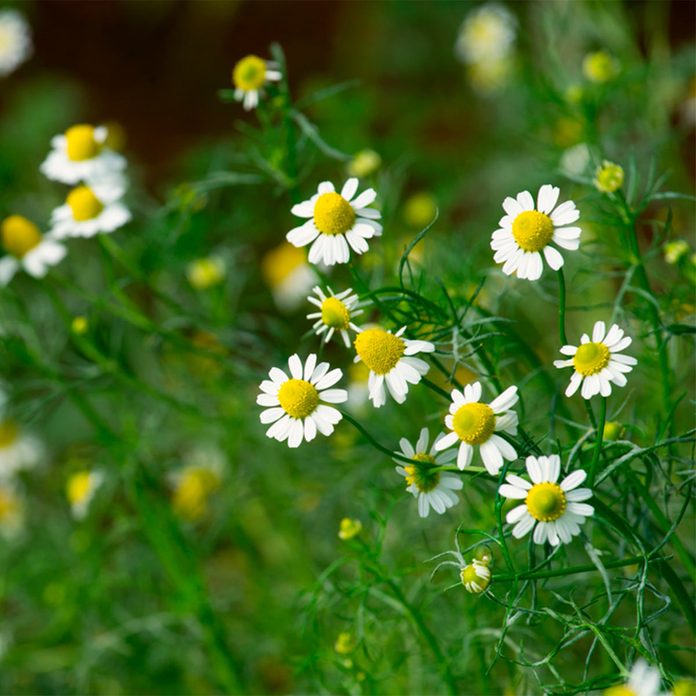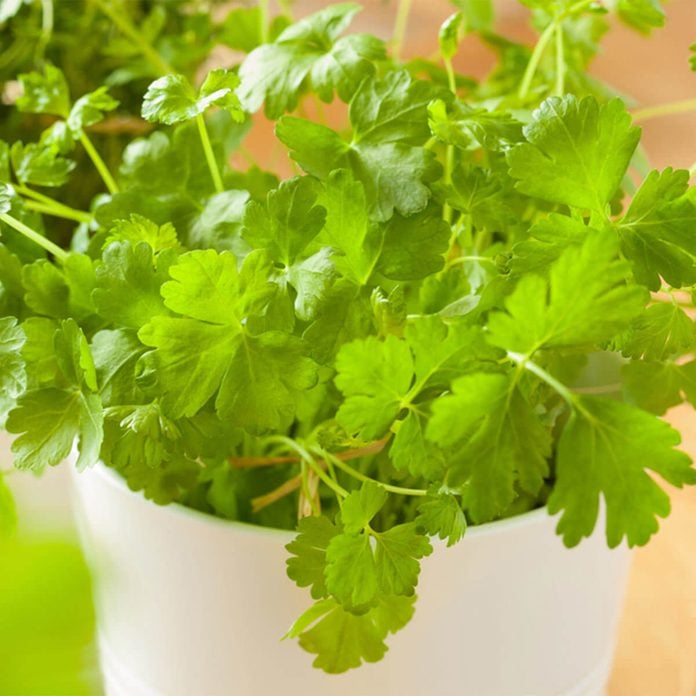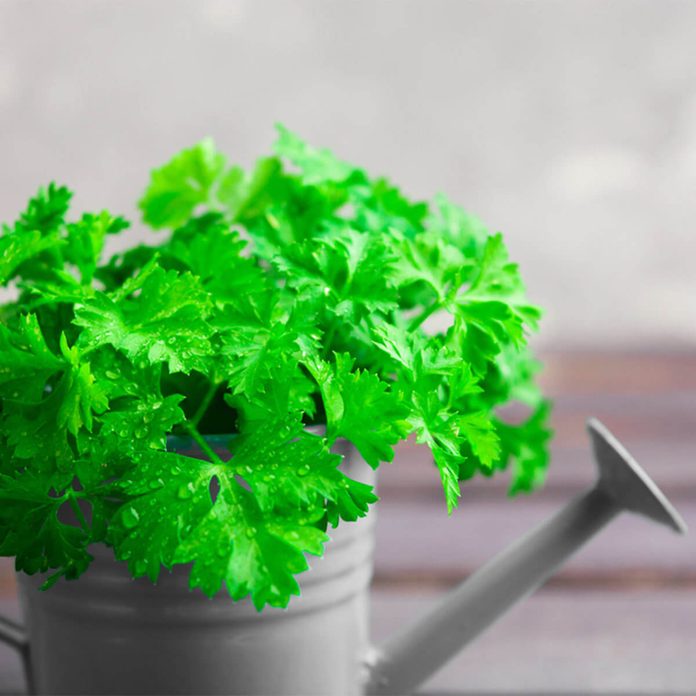Get more out of your garden by introducing herbs. They're not only attractive and useful, but they're also generally undemanding about soils.
12 Herbs to Plant in Spring

Basil
First on the list of great herbs to plant in spring is basil. An aromatic and flavorful herb, basil (Ocimum spp.) grows about one to three feet tall and wide, depending on species and cultivar. The most commonly grown basil plants are relatively compact and easy to slip into the garden.
It makes a fine companion for tomato plants, and it’s easy to keep compact when harvesting the fresh leaves for soups, salads, sauces, omelets, pesto, pizza topping and more. Basil also makes a fine dried herb, but it’s more flavorful fresh.
Sow seeds indoors in early spring. Transplant to a sunny spot in the garden after danger of frost has passed. Seeds can also be sown directly in the garden in areas with a long gardening season. Basil doesn’t do well when temperatures are below 45 degree F, so consider growing in a cold frame in cool climates. Basil also does well in indoor herb gardens.

Calendula
This annual flower, also called pot marigold, is a cool-season plant that reaches eight to 24 inches tall, depending on cultivar. The bright yellow flowers are a delight, but they have a practical role, too, adding color and peppery flavor to salads. Calendula (C. officinalis) flowers are used in facial tonic, mouthwash, hair rinse and skin ointment.
A self-seeding annual, it’s easy to grow by sowing seeds in place two weeks before the last average frost date. You can also start seeds indoors and transplant into the garden in late spring. Place plants in full sun. Although they’ll take part shade, they are more prone to powdery mildew in such conditions.

Caraway
A relative of the carrot, caraway (Carum carvi) is an annual or biennial that grows two feet tall and wide. This edible plant has many uses, some dating back 5,000 years, when caraway was first used for flavorings and medicine.
Young, finely cut, feathery leaves flavor salads, while roots are eaten as a vegetable. The flat heads of small white flowers eventually make way for seeds that are commonly used in baking and cooking. Moreover, raw seeds are said to increase appetite and also chewed to freshen breath or aid digestion. To grow caraway, sow seed directly in place in early spring, or in fall where winters are mild.

Chamomile
Next up on the list of herbs to plant in spring is chamomile (Chamaemelum nobile). Even the name sounds calming. This perennial herb, hardy in USDA Plant Hardiness Zones 4 through 10, has been enjoyed as a calming tea since ancient times. (Indeed, it’s other common name is Roman chamomile).
It grows about eight inches tall and 18 inches wide, featuring finely cut feathery leaves and daisylike flowers. The flowers are harvested as soon as they open and mixed into tea or honey. They’re also dried and used in potpourri. Easy to grow, chamomile can be started indoors in early spring. It prefers full sun but takes part shade.

Chervil
Although not as well known in the U.S., chervil (Anthriscus cerefolium) has carved out a “flavorable” reputation in France, where its faint licorice flavor is added to cream soups and dishes containing salmon or asparagus. Chervil is also a fine addition to cottage cheese. This annual herb, related to carrots and parsley, grows one to two feet tall and one foot wide.
Sow seeds directly in the garden in spring. Chervil prefers light shade and is ready 30 to 40 days after sowing.

Chives
Pretty, compact and simple to grow — that’s chives (Allium schoenoprasum). And that’s before mentioning its culinary prowess.
This perennial, hardy in USDA Plant Hardness Zones 3 through 10, grows in clumps 12 to 18 inches tall. It features one-inch-wide purplish pink pom-pom flowers, which are used fresh in salads and dried in decorative wreaths.
The slender, hollow leaves have a mild onion flavor to enhance salads, soups, sauces, chili and other foods. A close relative, garlic chives (A. tuberosum) has white flowers and flat, solid leaves with a mild garlic flavor.
Sow seeds indoors six to eight weeks before setting out in the garden in full sun or part shade. Or you can plant in the garden a few weeks before the last average frost date.

Cilantro
Cilantro (Coriandrum sativum) is what’s called a double threat in the sports world. Number one, cilantro leaves add a pungent tang to salads and Asian and Mexican dishes. (Harvest from the bottom of the plant for the most pungency.) Number two, cilantro flowers produce seeds (known as coriander) to flavor stew, sausage, veal and pork. That’s why it’s one of our favorite herbs to plant in spring.
It grows five to 24 inches tall, four to 10 inches wide. As an herb that likes cool weather, it’s a natural to sow directly in places like patio gardens or any other space during the early spring. If you allow cilantro to go to seed, it will self-seed in subsequent years. Give it full sun.

Dill
Dill (Anethum graveolens) is so attractive it can easily find a spot in the ornamental garden, yet it’s so useful to people and insects. Growing one to three feet tall and six to 24 inches wide, this lanky annual boasts frilly, fernlike leaves topped by flattened clusters of yellow flowers in summer. The seeds and leaves have a sharp, slightly bitter taste.
Dried or fresh leaves are used to flavor everything from potato salad, soups and omelets to fish, meat and poultry. But a real bonus is that dill foliage serves as an important food source for beneficial insects such as lacewings (which eat aphids) and swallowtail butterflies. Dill grows best in full sun.

Lemon Balm
Hardy in Zones 4 through 9, lemon balm (Melissa officinalis) is a bushy perennial herb that grows two feet tall and wide. The scalloped leaves have the scent of lemon with a hint of mint, and are great for adding to tea, lemonade, fruit salad or sprinkled over vegetable dishes.
A lemon balm tincture is used to treat maladies from anxiety and depression to indigestion and insomnia. To grow lemon balm, sow seeds indoors and transplant into the garden after danger of frost. Give it full sun or part shade.

Lovage
Although it dies to the ground each winter, the roots of this perennial persist in Zones 3 through 9 and will live to raise another crop year after year. Lovage (Levisticum officinale) grows two to four feet tall and wide. A relative of celery, lovage resembles and can substitute for its better known cousin. One bonus: The small yellow flowers are attractive to beneficial insects.
To grow lovage, sow seeds indoors in late winter and transplant into the garden as three-inch seedlings. Or simply sow seeds in place in early spring. Once plants are established, you can divide the roots and replant. Lovage prefers full sun or part shade.

Parsley
No list of herbs to plant in spring would be complete without parsley. This famous garnish has a lot more up its sleeve than it’s given credit for. A biennial that’s usually grown as an annual, parsley (Petroselinum crispum) reaches eight to 24 inches tall and wide and features a lush habit of dark green leaves.
The leaves, which are flat or curly depending on species, add nutrients and a somewhat grassy flavor to sautes, salads, soups and more. Parsley is also a breath freshener (so don’t leave it stranded on your dinner plate!).
To grow parsley, sow seeds indoors in individual peat pots that can be planted in the garden after danger of frost. Or sow outdoors in full sun. Germination can be slow, so be patient.

Sweet Marjoram
Last on our list of herbs to plant in spring is sweet marjoram. A relative of oregano, this tender perennial is grown as an annual outside its native range of Zones 9 through 11. Sweet marjoram (Origanum majorana) grows about one foot tall and six inches wide. Its velvety leaves and edible flowers have a mild, spicy-sweet flavor and are used in Italian dishes. They’re also added to salads, potato soup, fish and various meats.
Dried leaves are used in potpourri. Sweet marjoram infusions treat colds, fevers, coughs and more. As a steam, it’s a treatment for sinus problems. Sweet marjoram is also applied as a topical to sore joints and muscles, and sometimes put to use as a gargle.



















